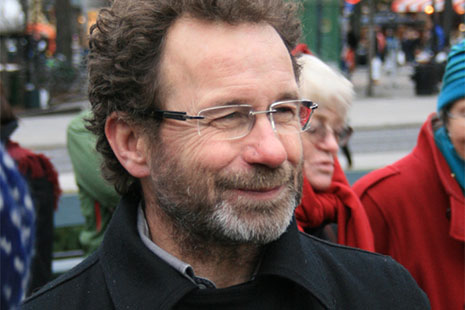I Curse the River of Time
By Per Petterson | Translated by Charlotte Barslund with Per Petterson | Vintage | $24.95
THERE’S nothing like a wintry Nordic setting for giving an edge to a novel. From compelling reads of the nineties like Peter Hoeg’s Miss Smilla’s Feeling for Snow and Kerstin Ekman’s Blackwater through to the Stieg Larsson trilogy, with many a sub-zero thriller in between, the white and treacherous landscape of northern Europe lends an extra, elemental quality to tales of murder and deceit. But for Per Petterson, the Norwegian novelist who won the IMPAC Award and the Independent Foreign Fiction Prize in 2006 for his best known work, Out Stealing Horses, the elements of snow and ice provide the background to much more domestic concerns, to meditations on family and in particular the relationships between parents and children.
Petterson’s most recent novel, I Curse the River of Time, first published in Norwegian in 2008, focuses on the fragility and strength of our connections to family, and the ways in which things never quite turn out as we hoped or planned. We can anticipate danger or disappointment and try to guard against them but the blows, when they come, are still likely to catch us by surprise. I Curse the River of Time begins with just such a blow, as the narrator Arvid Hansen recalls the time – we later discover that it is 1989 – when his mother is diagnosed with stomach cancer. It was not something she expected. As a smoker, she had always imagined a different fate.
Arvid’s mother remembers all the nights she would lie awake, “terrified of dying from lung cancer, and then I get cancer of the stomach. What a waste of time!” Petterson, a master of the laconic joke lurking in the gloom, has another twist in store in this irony of diagnosis. Arvid’s mother smokes menthols, which is explained by Arvid as a kind of avoidance tactic. “If you were scared of lung cancer you ended up smoking menthols.” And so, we are left to infer, perhaps this preventative strategy – of smoking menthols – actually worked. Arvid’s mother doesn’t get lung cancer, she gets something else. In a novel that focuses on our general inability to influence events, it’s a small but significant victory.
Arvid is a smoker too. “I have been my entire adult life,” he says, expressing it as a given, a condition of adulthood, rather than a choice. He too lies awake at night, worrying about the consequences not only of his smoking but of what it takes to participate in the world. Arvid has been a communist in his youth, turning his back on the university education his mother wants for him in favour of showing, by means of political activism and a job in a factory, solidarity with the workers. He falls in love, with communism and with China and with the girl who becomes his wife. But by 1989, he has lost faith in “the great country that had once been our Jerusalem,” and his wife has lost faith – or interest – in him.
In 1989, that fulcrum of a year, Arvid is thirty-seven. Winter is coming, his mother is dying, his marriage is collapsing and, not very far from his home in Oslo, the Soviet Union is on the way to collapsing too. Farther away the protestors have been killed in Tiananmen Square. One of the remarkable achievements of I Curse the River of Time is the way in which Petterson illuminates, while never labouring, the connections between smaller events (a mother’s death, a couple’s divorce) and large, geopolitical shifts – the connections, if you like, between the personal and the political. In the end, Petterson seems to say, it’s all personal.
Arvid even manages to personalise Mao – a difficult task at the best of times – as “someone I was drawn to, someone who had felt how time was battling his body, as I had felt it myself.” His brother recalls how Arvid “used to talk to Mao,” via a poster that hung above his bed, and Mao, in effect, talked back. A portentous line from one of Mao’s poems – “I curse the river of time” – seems to Arvid to speak to him directly, linking him to the great helmsman. These links to the larger-than-life people and events of history can take on a sinister tone; when Arvid edits his own brother out of a childhood memory, he speaks of erasing him, “like Stalin erased Trotsky.”
Against these problematic links with history, there are many smaller stories that aren’t told; the story of Arvid’s parents, his brothers, his wife or his children. Yet enough is said of all of them to help us build up a picture – a picture of Arvid’s wife, for example, and her fractured relationship with her own parents, her early hopes for her marriage and her subsequent disappointment. Petterson creates an absorbing narrative out of stray clues and glancing references. “I have never really been able to see enormous changes coming until the last minute,” says Arvid, but that is what holds our attention, in novels as in life. Arvid’s mother doesn’t want to die in 1989. Russia is in chaos, “it’s all hanging by a thread.” She wants to hang on too, “to see how it all turns out.” •




